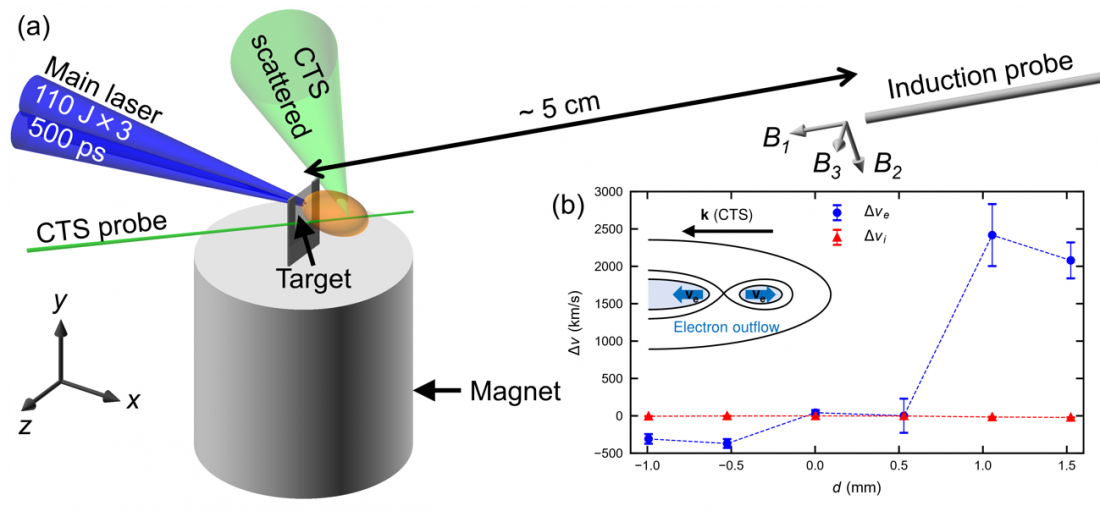(a) Schematics of the experiment. By irradiating a plastic target with the Gekko XII laser, plasma flow is generated in the presence of a weak magnetic field. The weak magnetic field is distorted by the dynamic pressure of the plasma flow and the anti-parallel magnetic configuration is created. (b) The insert schematically shows that the elongated magnetic field reconnects and releases the magnetic field energy as the reconnection outflows. Pure electron outflows have been measured with CTS for the first time in laser-produced plasmas.
First experimental measurement of pure electron outflows associated with magnetic reconnection driven by electron dynamics in laser produced plasmas
Osaka, Japan – Magnetic reconnections in laser-produced plasmas have been studied to understand the microscopic electron dynamics, which is applicable to space and astrophysical phenomena. Osaka University researchers, in collaboration with researchers at the National Institute for Fusion Science and other universities, have reported the direct measurements of pure electron outflows relevant to magnetic reconnection using a high-power laser, Gekko XII, at the Institute of Laser Engineering, Osaka University in Japan. Their findings are published in Springer Nature, Scientific Reports.
Magnetic reconnection is a fundamental process in many space and astrophysical phenomena such as solar flares and magnetic substorms, where the magnetic energy is released as the plasma energy. It is known that electron dynamics plays essential roles in the triggering mechanism of magnetic reconnection. However, it has been highly challenging to observe the tiny electron scale phenomena in the vast universe.
Thus, the researchers have created situation-only electrons directly coupled with magnetic field in laser-produced plasmas. The so-called laboratory astrophysics allows one to access the miniature universe.
“In space plasmas, the key players sometimes hide in the small scale. It is very difficult to see their actions in large-scale space phenomena, even via cutting-edge numerical simulations,” study author Toseo Moritaka explains. “Now laser experiments can arrange a new stage to shed light on their actions. The results will bridge various observations and simulations in macroscopic and microscopic points of view.”
By using collective Thomson scattering measurements, the pure electron outflow associated with the electron-scale magnetic reconnection has been measured in laser produced plasmas for the first time.
“The outcomes of this research are applicable not only to space and astrophysical plasmas, but also to magnetic propulsion of spacecrafts and also fusion plasmas,” study lead author Yasuhiro Kuramitsu explains. “Microscopic electron dynamics governs macroscopic phenomena, such as magnetic reconnections and collisionless shocks. This is a unique and universal property of plasma, which is not seen in ordinary gas and liquid. Now we can address this in laboratories by direct local measurements of the plasma and magnetic field. We will tackle long-standing open problems in the universe by modeling them in laboratories. Knowing the nature of plasmas may lead us to realize, for example, fusion plasma.”
###
The article, “Direct observations of pure electron outflow in magnetic reconnection,” was published in Scientific Reports at DOI: https://doi.org/10.1038/s41598-022-14582-3
About Osaka University
Osaka University was founded in 1931 as one of the seven imperial universities of Japan and is now one of Japan's leading comprehensive universities with a broad disciplinary spectrum. This strength is coupled with a singular drive for innovation that extends throughout the scientific process, from fundamental research to the creation of applied technology with positive economic impacts. Its commitment to innovation has been recognized in Japan and around the world, being named Japan's most innovative university in 2015 (Reuters 2015 Top 100) and one of the most innovative institutions in the world in 2017 (Innovative Universities and the Nature Index Innovation 2017). Now, Osaka University is leveraging its role as a Designated National University Corporation selected by the Ministry of Education, Culture, Sports, Science and Technology to contribute to innovation for human welfare, sustainable development of society, and social transformation.
Website: https://resou.osaka-u.ac.jp/en



